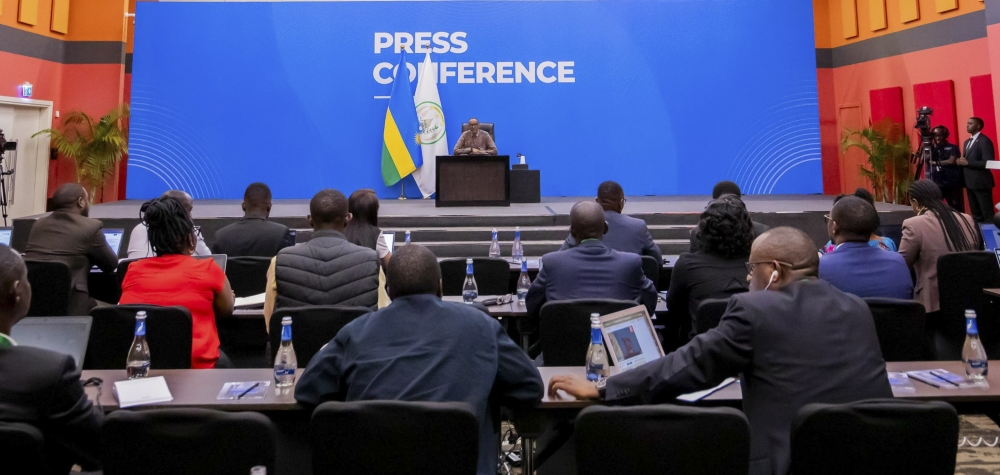

Regional leaders must not give up in their effort to find a lasting solution to the problem of endless conflict in eastern DR Congo "but it can’t be business as usual,” President Paul Kagame told a news conference in Kigali on Thursday, January 9.
In spite of all the recent ups and downs in efforts aimed at finding a solution, he said, "we can’t just live with it and give up” and there has to be a way of finding a solution.
ALSO READ: DR Congo crisis can be addressed without the manipulation—Kagame
His statement came about three weeks after the abrupt cancellation of an earlier proposed Luanda Summit where Kagame and his counterparts, Felix Tshisekedi of DR Congo and the host, João Lourenço of Angola, were to meet and, possibly, make progress as regards finding a solution to the crisis.
ALSO READ: Rwanda calls for ‘serious actions’ on FDLR as Luanda summit is postponed
Before the presidents’ meeting was postponed, mid last December, the three countries’ foreign ministers had faced a deadlock during negotiations in the Angolan capital.
The seventh ministerial meeting was meant review a draft agreement that would be signed by the presidents the next day.
But the ministers hit an impasse after Congolese foreign minister Therese Kayikwamba Wagner surprised her counterparts Olivier Nduhungirehe of Rwanda and Tete Antonio of Angola by refusing to approve a proposal on direct dialogue between her government and M23 rebels.
ALSO READ: DR Congo: Nduhungirehe calls out International Community over double standards
Kagame said: "There has to continue an effort to find a solution to this problem. But it can’t be business as usual. We can’t continue the way we have been doing it; putting the importance of the process above the results...what we are looking [for] are the results, not the process, but we need to do what is right.”
‘FDLR question has to be answered’
"On that note, really, the [Luanda peace process] effort has to keep in place and we have to keep asking ourselves the right questions and finding the right answers. The FDLR question has to be answered. There’s no being dodgy about that and circling about the problem ...we have to find a solution.”
For the past three decades, eastern DR Congo has been home to a militia linked to the 1994 Genocide against the Tutsi in Rwanda, which continues to destabilize the region especially by spreading an anti-Tutsi genocidal ideology and persecuting Congolese Tutsi communities.
When the Rwanda Patriotic Army stopped the Genocide against the Tutsi, in July 1994, the ousted genocidal regime’s army (ex-FAR), politicians, and Interahamwe militia that had committed Genocide – runaway, en masse, with their weapons, to eastern DR Congo, then known as Zaire.
They later banded together into what they called the Army for the Liberation of Rwanda (ALIR).
ALSO READ: Former FDLR deputy president on how genocidal militia was established in May 2000
In 2000, soon after Washington listed ALIR as a terrorist organization following its murder of American tourists in Uganda’s Bwindi Forest, they formed FDLR to evade or distance themselves from their horrendous crimes. To date, the genocidal militia is at the heart of the insecurity affecting eastern DR Congo and the region.
Tied with the problem regarding the genocidal militia’s threat, Kagame reiterated, the internal problems of DR Congo "of persecuting their own people and making it our [Rwanda] problem by giving us refugees and by giving us all sorts of names; that we are supporting those people fighting for their rights in DRC,” also has to get a solution.
ALSO READ: DR Congo needs to stop the blame game and embrace constructive dialogue
He added: "And the solution lies in internal [DR Congo] political processes for dialogue. If you want a solution then the character of the process and the quality of it explains it. People can see what you are doing and understand that you actually want a solution.
"So, the [Luanda] meeting did not happen because, again, it wasn’t the appearance there that was the most important thing. It was what was taking us there and how it is being addressed that was more important.”
"Before the summit was to take place there had been technical people meeting and discussing and ministers meeting. The technical people would agree on things and then when it comes to ministers, what the technical people agreed, half of it is rejected. And, mark you, and check, it was really to be rejected by DRC not Rwanda.”
"Even if, earlier, it was endorsed by technical people from DRC, and agreed by our people and the Angolans, it comes to the meeting of ministers and the [Congolese] minster says ‘no, this one cannot happen’. So, they go on for a long time and the ministers’ meeting comes and when they are getting close to something the minister of DRC steps out and makes a call and comes back and says, ‘no, I don’t want this’. So, that’s what killed the summit. Its not Rwanda that killed the summit. Its actually DRC.”


